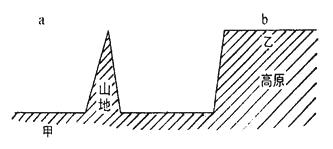问题
单项选择题
下图中甲、乙两地的纬度相同,a处气温比近地面气温低的主要原因是()

A.地面是大气的主要直接热源
B.太阳辐射是大气的主要直接热源
C.a处大气的散射作用比近地面强
D.a处的太阳辐射比近地面弱
答案
参考答案:A
解析:
太阳辐射是大气的能量来源,不是直接热源,因为大气直接吸收的太阳短波辐射较少。地面是大气的主要直接热源(近地面大气),因为大气对地面长波辐射吸收较多,近地面大气吸收热量以后再通过对流、传导等方式向上专递,近地面大气(对流层)气温随高度升高而递减。所以a处气温比近地面气温低的主要原因是A。
考点:该题考查大气受热过程。
